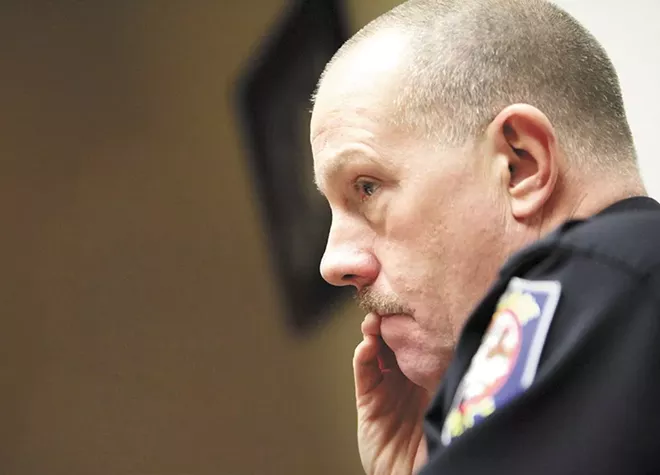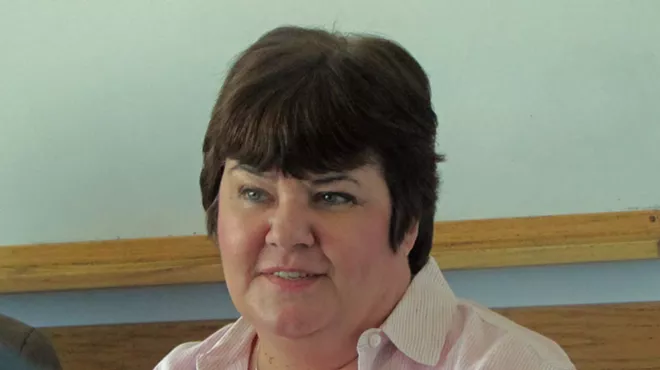Thursday, July 28, 2016
Straub report cites at least 25 times that city officials were alerted to the chief's concerning behavior

Time after time, Cappel's report reveals, police department employees raised concerns about former Spokane police Chief Frank Straub.
The Condon administration can't say it wasn't told.
Since at least the fall of 2013, questions have loomed around City Hall about police Chief Frank Straub.
Was Straub a loose cannon who got results? The sort of leader who generated complaints,
Or was he a destructive boss who, as a newly released investigative report indicates, was abrasive, unprofessional, and verbally abusive, volatile, threatening, demeaning, profane, vulgar? Was he the guy who, as the report concludes, "managed by fear and intimidation," "created a hostile work environment in violation of the City’s general harassment policies" and wielded personnel moves as a weapon to punish employees who crossed him?
Before his forced resignation, the report by investigator Kris Cappel reveals, the city never conducted a full-scale investigation into that issue. Yet, the Cappel report outlines time and time again when police department employees alerted Condon administration officials — including city attorneys and the Human Resources director — to red flags about Straub's behavior. City Councilman Ben Stuckart said three different employees brought concerns to him. By April of 2015, the mayor, the city administrator, and the chief financial officer had also been told directly about serious concerns about Straub.
Here's Cappel:
As early as the fall of 2013, the Administration and members of the City Attorney’s office were generally aware that Chief Straub had an explosive temper, that he sometimes mistreated his staff, and that he had an unprofessional management style.Many of these concerns the police department raised echoed complaints that had been made in his previous job in Indianapolis, which he left facing a vote of no confidence. Yet, even as Straub created chaos within the department, sparking self-demotions and transfers, the Cappel report portrays the Condon administration as incurious about why.
It does not appear, however, that the Condon Administration or the lawyers knew about or fully appreciated the depth and breadth of the SPD’s concerns about Chief Straub’s leadership until the meetings with the Association and the executive team in September 2015.
When Assistant Chief Craig Meidl took a three-step demotion in February 2014, "no one from the Condon Administration asked him why he was stepping down" Cappel writes.
And after Brad Arleth was demoted, Cappel says, the city put out a press release saying it was "mutually agreed-upon under the department’s reorganization." Arleth told Cappel that was false — it was forced. He sent an email to city spokesman Brian Coddington explaining it was false, Arleth told Cappel, but never got a reply back. (In a bit of symmetry, Condon later also referred to Straub's resignation — signed under threat of termination — as a mutual decision.)
The closest the city got to a broad formal investigation into Straub was limited to one incident — a profanity-laced blowup on March 31, 2015. That one was conducted by city attorneys, not human resources. No notes were taken, a major witness was not interviewed, and the inquiry was limited to just that incident — not Straub's overall behavior.
Contrast that with the extensive whistleblower investigation conducted, around the same time period, into the actions of the volunteers on the ombudsman commission.
In a short interview in September, Straub dismissed the criticism against him as the natural byproduct of change.
"I was told to change things and change them quickly, and
After all, during his tenure, violent crime and use-of-force incidents decreased. And he embraced a lot of the reforms being recommended by the U.S. Department of Justice and the Use of Force Commission. But the Use of Force Commission handed the choice of whether to conduct a cultural audit of the police department to the very man an audit of the department's culture might have exposed.
"We take Chief Straub at his word on this and defer to his judgment," the Commission stated. The audit, unsurprisingly, didn't happen.
Here, we've attempted to tally the incidents Cappel has identified where city officials outside of the police department were alerted to concerns about Straub's actions. Often, they were told the city was aware of the
2013
The day after Nemec went to HR, he was called into Straub’s office. Mr. Nemec reported that Chief Straub “laid into” him. He was “red hot” and gave Nemec a “butt chewing.” Mr. Nemec said that the Chief went on and on about making a complaint about the promotions, crying to people, and making a fool out of himself. Straub told Mr. Nemec he was a “despicable excuse for a sergeant.” Straub also said if he ever caught Mr. Nemec opening his mouth about the promotion again, he would have “his ass.”
Straub immediately transferred Mr. Nemec from his burglary assignment to swing shift patrol. Nemec said he was the third most senior sergeant at the time, and he felt the move was retaliatory.
2. Spring of 2013: Lt. Dave McCabe, president of the Lieutenants & Captains Association, brings up his concerns about Straub with City Council President Ben Stuckart.
“We wanted to make sure that people in the upper levels of City Hall knew what they had gotten with Chief Straub,” McCabe said.
"He didn't go into 'hostile work
Stuckart says Straub was defensive, and pushed back, arguing the backlash was a natural consequence of change. Stuckart told Cappel that Lt. Joe Walker and Analyst Ben Krauss also approached him to share concerns about favoritism and the toxic impact of the department's restructuring.
Stuckart says former city councilman Mike Allen passed along some of these concerns with city administrator Theresa Sanders.
3. Fall of 2013: Assistant City Attorney Mary Muramatsu witnesses Straub ream Capt. Keith Cummings about his Compstat presentation.
After that CompStat meeting, Cappel writes "Ms. Muramatsu came to Cummings and said, 'I think what happened to you was absolutely ridiculous,'” and she indicated that she was going to talk to somebody about it.
4. November: Muramatsu, according to former Director of Business Services Carly Cortright, indicated she was alarmed at how Straub was treating female employees in the department.
2014
5. Sometime in 2014: Capt. Dan Torok brings up his concerns with Straub's behavior with City Attorney Nancy Isserlis. He says he might have mentioned to Isserlis that he saw Cotton wearing the chief’s police jacket during the 2013 or 2014 Bloomsday Race, which he thought was pretty weird.
"I think I referred to that when I'm talking to Nancy," Torok told Cappel. "It looks like [Cotton's] wearing his letterman's coat, you know what I mean?"
6. Sometime in 2014: At informal, after-hours dinners, Cortright tells HR Director Heather Lowe and Assistant City Attorney Erin Jacobson about Straub's abusive management style.
"Heather was aware of some of the treatment," she told Cappel. "The belittling. The … getting upset with me about when I would tell him 'No.'"
Lowe confirmed to Cappel that she knew about this.
"She was aware from several sources, including her husband, that many people tried to keep their heads down to stay off of Chief Straub’s radar, and intentionally tried to work in locations away from Chief Straub, saying there is a 'feeling of protection to know we’re arm’s length away,'" Cappel wrote. "Ms. Lowe had no recollection of ever having referred any issues to other City staff regarding Chief Straub."
7. Jan. 9: Lt. Joe Walker tells Assistant City Attorney Erin Jacobson about a meeting where Straub abusively reamed Walker in front of his
According to Cappel, Straub made the following statements during that meeting.
• Walker was a quitter and the Mayor and Ms. Sanders had no respect for him.8. Jan. 15: In a meeting that included Capt. Brad Torok, then-Capt. Rick Dobrow and Jacobson, Walker describes Straub's abusive behavior to HR Director Heather Lowe. Walker says he never received any followup from the meeting. Lowe says she had to talk Straub out of taking disciplinary action without cause against Walker.
• Walker had “shit himself” by self-demoting.
• The Mayor did not have any balls to be a leader.
• The Mayor expects his cabinet to be “balls to the walls.”
• The Mayor didn’t give two shits about families and divorces.
• Theresa Sanders didn’t need her job because she is a Microsoft millionaire.
• Straub wanted to “choke” that “f—-ing fat as*,” referring to Capt. Cummings.
9. Feb. 28: Lt. Joe Walker shares his concerns about a possible inappropriate relationship between Cotton and Straub with Civil Services Commission Chief Examiner Gita-George Hatcher. He also expressed concerns about retaliation for making a complaint about
10. March 17: HR Director Heather Lowe meets with Lt. Joe Walker over coffee. Walker says he shared his concerns about retaliation and tells Lowe about Straub's "I love you" text message to Cotton. Lowe told him she'd look into it.
Lowe says she had no recollection of meeting Walker for coffee — despite an email proving the meeting happened —and does not remember him mentioning the "I love you" text.
"It does not appear that anyone in the Mayor’s Administration undertook any effort to
address the persistent rumors of a romantic relationship between Chief Straub and
Ms. Cotton or to investigate the facts and circumstances of the [I love you] texts until after
Ms. Cotton asserted her sexual harassment allegations in April 2015," Cappel writes.
11. April 28: Walker tells Erin Jacobson about Straub's “bullying and harassment,” and says Jacobson assured him City Hall was aware of the issues.
12. May 15: At a labor management meeting McCabe brings up concerns that Straub was retaliating against the association because of a complaint the association leveled against Cotton.
13. July: Walker tells Muramatsu about his concerns about Straub's intention in creating the Civil Enforcement Unit and using seizure funds. She assures him that she's keeping City Attorney Nancy Isserlis up to date.
14. Summer or Fall: McCabe participates in a meeting with Walker and Jacobson where they discuss their concerns about Straub.
"We made sure Erin knew all the goofy stuff that was going around the department, all the several personnel changes, the chief’s behavior, and the way that he spoke to people," McCabe says.
15. November: Walker files a whistleblower complaint about the use of the civil forfeiture funds. He tells Erin Jacobson about the "I love you" text. Jacobson, according to Walker, told him that her higher-ups knew about the concerns about Straub.
2015
16. March 31: Capt. Olsen calls Jacobson to let her know about Straub's massive, profane blowup in a meeting discussing the use of overtime.
17. Sometime soon after March 31: Director of Strategic Initiatives Tim Schwering tells Mary Muramatsu about Straub's blow up and suggests that it could rise to an Equal Employment Opportunity issue.
18. Sometime soon after March 31: Schwering meets with Chief Financial Officer Gavin Cooley and informs him about the Straub blowup.
"I think Gavin probably put it the best," he told Cappel. "'Frank’s an asshole but he’s our asshole.' ... I don’t think they quite realized it was at that level that it was."
20. Sometime after March 31: Deputy Director of Strategic Initiatives Sarah Lynds meets with Theresa Sanders and Schwering, and they describe Straub's "bullying" and "retaliation."
Sanders told Cappel she first learned of the March 31 incident from Schwering. Before that, she says, she hadn't heard of anything similar.
"Frank’s a difficult personality, and he’s a demanding person," she told Cappel. "So I had never prior to that incident heard of him just unleashing on staff like that."
21. April 3 (or possibly April 10): Cotton shares her sexual harassment complaint with Condon in a closed-door meeting in her attorney's office. She asks him not to investigate the sexual harassment.
Condon knew Straub had a temper, but this was the first time he'd heard of informal bullying or harassment claims, he told Cappel.
"Mayor Condon said he was not aware that any City employee had ever raised claims of
harassment, retaliation, or bullying against Chief Straub, formally or informally, before
he met with Ms. Cotton," Cappel wrote.
22. April 13: Cotton elaborates on her sexual harassment claims on a phone call with Sanders, but Sanders does not ask for any details.
From April 14-16 the city attorney's office conducts a short investigation into the March 31 incident. They do not take notes, nor ask for copies of notes for their records. They do not interview Monique Cotton, despite her willingness to discuss the issue in this context. Straub, according to Condon, is asked in general terms about the sexual harassment incident. But otherwise, the investigation is confined strictly to the March 31 meeting, to Cotton's surprise.
"We were unable to determine with any certainty whose decision it was to limit the inquiry to the March 31st incident," Cappel writes.
23. April 21: In a meeting with Condon and Sanders, Straub admits to having previously had a flirtatious relationship with Cotton.
"He indicated that he had a mutual flirtation with Monique that had ended quite a long time ago," Sanders told Cappel. He denied a sexual relationship. He also admits his March 31 blowup was extremely inappropriate. He offers to write an apology, but Sanders tells him that she doesn't believe in forced apologies.
Sanders told Cappel that she didn't consider the meeting to be disciplinary and there was no thought to terminating him.
24. Sept 8: The Lieutenants & Captains Association share their concerns about Straub with Sanders and the mayor.
"One thing that the membership all agreed on was that Chief Straub was perceived to be an abusive leader who had lost the trust and respect of his senior command staff," Cappel writes.
They agreed the relationship was not salvageable.
25. Sept. 10: The police department's executive team meets with the mayor, and shares many of the same complaints about Straub.
26. Sept. 18: Tim Schwering hand-delivers two letters, from the Lieutenants & Captains Association and Straub's executive team. These letters sparked Condon's decision to ask for Straub's resignation.
Tags: Scandal at City Hall , Cappel Report , Straub , News , Image






















